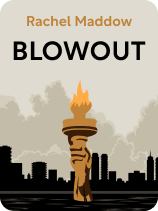

This article is an excerpt from the Shortform book guide to "Blowout" by Rachel Maddow. Shortform has the world's best summaries and analyses of books you should be reading.
Like this article? Sign up for a free trial here.
How can a country rich in resources be so poor? Why is the energy industry a bad investment for developing countries?
You would think that a country rich in natural gas and oil would also be rich in money, but you’d be wrong. The natural resource curse refers to the idea that countries rich in natural resources tend to suffer the most because the money often goes to authoritarian governments, rather than the people.
Read below to learn about the natural resource curse and how it came about.
How Energy Production Can Weaken a Country
While oil and gas production has been extremely profitable for the US and has increased American influence abroad, this is not the case for the majority of energy-producing countries. In her book Blowout, Rachel Maddow cites The Paradox of Plenty by Terry Karl as originating the theory of the natural resource curse, the idea that countries with an abundance of natural resources tend to be more authoritarian, have less stable economies, and experience greater social unrest and violence than countries that profit mainly off of manufacturing and trade.
(Shortform note: The Paradox of Plenty focuses on Venezuela, a founding member of OPEC whose economy is largely dependent on oil to this day. Karl argues that the oil boom and subsequent bust of the 1960s-’90s contributed to the political and social upheavals of the same period. The resource curse theory has also been applied to countries where the primary natural resource is diamonds, gold, or other precious metals, such as in the Democratic Republic of the Congo.)
This theory applies primarily to so-called developing countries, which have historically been colonized by Europe. The governments of these countries tend to be comparatively young—most are less than a century old—and dependent on their relationships with foreign banks and companies. These largely European and American partners encourage developing governments to exploit their country’s natural resources to compete in the global market but provide little assistance toward diversifying their economies (so that they aren’t at risk of total collapse when a certain product crashes) or developing essential public infrastructure (such as roads, hospitals, schools, and workplaces for locals, like factories).
(Shortform note: Many post-colonial economists and scholars agree with Maddow that the relationship between international (but European-led) economic organizations like the International Monetary Fund or the World Bank and struggling nations in the global south are paternalistic and exploitative. Though these groups purport to offer assistance, their economic ideas are based on Western, free-market models that don’t always serve the needs of the receiving nation. Their loans are also notoriously difficult to pay back, becoming a burden more than a bailout.)
As a result, while developing countries make a lot of money from selling off their natural resources or access to drill sites for foreign companies, these profits are concentrated in the hands of a few businessmen and government officials. Few jobs are produced by investing in the energy industry, and the quality of life for the average citizen remains low.
(Shortform note: The resource curse is sometimes called “Dutch disease,” after the discovery of a massive natural gas field in the Netherlands in the late 1950s led to a decline in the country’s manufacturing sector. Economists argue that while mining the gas produced enormous profits, this success altered the value of the country’s currency, making all of its other products more expensive and thus less competitive on the international market. As a result, gas was the only product that could succeed. It’s also suggested that the initial “boom” led to disinvestment in other industries, as the country tried to profit off of what turned out to be a finite resource.)

———End of Preview———
Like what you just read? Read the rest of the world's best book summary and analysis of Rachel Maddow's "Blowout" at Shortform.
Here's what you'll find in our full Blowout summary:
- A deep dive into the corruption and exploitation in the oil and gas industry
- Examples of how the discovery of oil can weaken a country
- Possible ways to protect the world from the energy industry






